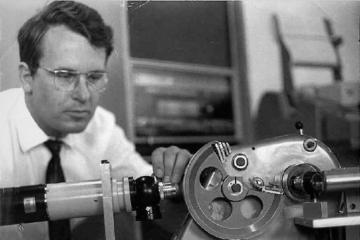By Piet de Klerk
 In the 1970s Frits Veerman (1944-2021) was a young professional photographer in Amsterdam. He was the first to blow the whistle on what was to become the most prominent nuclear technology smuggling ring in history, but was punished for his honest and courageous action. Veerman died a few weeks ago.
In the 1970s Frits Veerman (1944-2021) was a young professional photographer in Amsterdam. He was the first to blow the whistle on what was to become the most prominent nuclear technology smuggling ring in history, but was punished for his honest and courageous action. Veerman died a few weeks ago.
At the time Veerman worked at the consultancy FDO (which stands for Fysisch-Dynamisch Onderzoek), part of the Stork concern. One of FDO's large clients was UCN (Ultra Centrifuge Netherlands), for which it researched the metallurgical aspects of gas centrifuges for uranium enrichment. In May 1972 a new colleague arrived: Abdul Qadeer Khan, a Pakistani metallurgist who had studied in Germany and the Netherlands and who had done his PhD in Leuven, Belgium.
Veerman got along well with his new Pakistani colleague, the two shared an office. Khan was an attentive, easy going young man with a ready smile. After a while Veerman started to join Khan for dinner from time to time at his home in Zwanenburg, near Schiphol Airport, where he met Khan's wife Hendrina and their two daughters.
Veerman's new colleague was sent to the UCN plant in Almelo, because Khan's expertise was wanted. Pretty quickly Khan spent a lot of time in Almelo and despite his low clearance he didn't spend his time only in his designated office, but managed to roam around the facility, helping UCN colleagues with their problems.
Veerman started to be somewhat suspicious in 1973, but it was only in mid-1975 that alarm bells went off. He saw highly classified drawings in Khan's house - against all rules. Veerman was asked by Khan to photograph those classified centrifuge drawings before the originals went back to the plant (which Veerman refused). Moreover he heard Khan discuss sensitive centrifuge matters by telephone with his old professor in Leuven. Veerman was concerned and informed his superiors at FDO and other relevant players. The net result of his efforts was that he was told to keep his mouth shut.
The A.Q. Khan story is well known: Khan's letters, prompted by the Indian explosion in May 1974, to Prime Minister Zulfikar Ali Bhutto - who had instructed Pakistani scientists to work on nuclear weapons in 1972; his efforts to collect as much information about centrifuges as possible in the course of 1975; his return to Pakistan, taking control after a while of the Pakistani enrichment efforts, and building the Kahuta enrichment plant that supplied the highly enriched uranium for the Pakistani nuclear tests in 1998.
Veerman was not the only one who became suspicious. In the second half of 1975 several incidents came to light: an order in the UK for frequency converters used for the motors that drive centrifuges, an order in France from the Pakistani embassy in Brussels clearly based on an UCN document, and Khan's suspicious behaviour at a nuclear exhibition in Basel. But Veerman was the first whistle-blower in the Khan case and he was treated the worst.
Veerman and Khan carried on a correspondence after Khan's return to Pakistan in late 1975. Khan's letters included technical questions about classified matters. When Veerman showed one of these letters to his superiors he was told to burn it. In 1978 he was fired.
In 1981 the A.Q. Khan letter resurfaced and played a pivotal role in the Amsterdam court case against Khan. The court sentenced Khan to four years in prison, but that sentence was later annulled for formal reasons: the summons had never reached the accused. The Netherlands Government had done what it could to reach Khan, had gone to his house, where the doorbell wasn't answered, had then invoked the assistance of the Pakistani Foreign Ministry, which said 'no problem', accepted the summons and then probably dropped the document in the waste paper basket.
Frits Veerman's role was one of the many pieces of the Khan Affair, especially if we define the Khan Affair not only as Khan's key part in the Pakistani nuclear weapons programme, but include also his central part in the smuggling ring that offered centrifuge technology to Iran, Iraq, Libya and North Korea - until his enterprise came crashing down in 2003. But Veerman's role is important because he took classification and non-proliferation rules seriously and acted on his suspicions in an honest and courageous way.
Veerman was starting to be recognized for his actions when the Whistleblowers Authority - a Dutch institution that was created in 2016 - came to the conclusion that Veerman was unfairly treated at the time, as it considered it likely that whistleblowing was the reason for firing him in 1978. And he was at the center of the documentary Under the Spell of the Bomb.
It is likely that commercial interests explain to a large extent why Veerman's s efforts in the 1970s were ignored, but what else played a role is unclear. There are still many unanswered questions in the Khan Affair, related to events in the Netherlands, the United States, Pakistan and elsewhere. Getting to the bottom of them would help make non-proliferation policy more effective.
Photo: Transparency International Netherlands